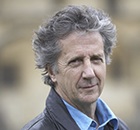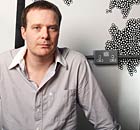by: Thomas McMullan
In an interview with the Paris Review, the American poet Frederick Seidel mentions a time in the 1970s when he visited an old girlfriend at Columbia University. Seidel's girlfriend was studying for a PhD in Electrical Engineering and during his stay the poet was given five minutes to work in a secure room on the Defence Department mainframe:
"The computer was enormous and filled the room but it had such a tiny screen. I typed out the beginning of my poem Homage to Cicero and was hooked then and there. What hooked me was the way you could instantly change the shape of the stanza, the length of the line. It was the instantly part that got me."
With ebooks on course to outsell printed editions in the UK by 2018 much has been written about the subject of technology in terms of readers, but it's often overlooked that new tech does more than give writers a different cut of cloth to scribble on. Writing with electronic devices has affected structure, research and editing. It has affected order and it has affected rhythm, from the tap-tap-swipe of a typewriter to the swipe-swipe-tap of tablet.
 No excuse for sloppinesss … Blake Morrison
No excuse for sloppinesss … Blake Morrison
"In the early days of word processing you'd often hear the complaint that novelists were writing too much – not shaping as they used to when they had to work on a typewriter," says the poet and author Blake Morrison. "I don't think it's true. When it's so easy to cut and paste, and to create multiple drafts rather than having to type them out afresh each time, there's really no excuse for sloppiness."
As Morrison suggests, the order offered by computers has made indexing, saving, copying and pasting all essential parts of putting together a modern piece offiction. Writing with word processors has given a new organisation to shaping sentences but it has also given flexibility; paragraphs can be switched, flipped and thrown out with an ease that would've been impossible when working with a typewriter. As we become increasingly inundated with little black screens this fluidity is becoming ever more central to how writers shape their work.
"Most notes are on my phone now. It's more subtle than taking out a notebook and means you can pick apart your friends or family while they think you are sending a text," says Joe Dunthorne, critically acclaimed author of Submarine.
 Lazier or freer? Joe Dunthorne
Lazier or freer? Joe Dunthorne
"I don't do much planning with my novels which means I end up with lots of offcuts and dead ends. I used to keep a file on my computer called "recycle" where I stored all the decent ideas saved from discarded chapters and stories and poems. The idea was that, eventually, all these lines would be rehoused. But increasingly I use the search function. In seconds, I can find every simile I've ever written about an onion or every description of a particular character asleep. I'm able to pull together resources in a much more fluid way. I can't quite decide whether this has made me a lazier writer or a freer one."
So does the inclusion of new digital techniques mean other parts of the author's process are being left behind?
 Necessary mess … Zoe Pilger
Necessary mess … Zoe Pilger
"I write on a laptop. I've just got a really old laptop that weighs three tonnes so I never take it out of the house. The only time I write by hand is when I take notes. It's a complete mess," says Zoe Pilger, author of Eat My Heart Out and art critic for The Independent. "Writing on paper in that way allows for incoherence and messiness which is a necessary stage of the creative process."
While most writers still work on paper at some stage, the act of physically underlining and crossing-out sentences is paling in comparison to digital highlights and tracked changes.
In Civilisation and its Discontents, Sigmund Freud links technology with amputation, with the tools created by man replacing his organs and limbs: "Man has, as it were, become a kind of prosthetic God," says Freud. "When he puts on all his auxiliary organs he is truly magnificent, but these organs have not grown onto him and they still give him much trouble at times." Freud was a heap of dust by the time Microsoft Word came along, but does his point hold for modern writers? Has anything been lopped-off from the contemporary author to make room for all the new ways of writing? "Following Freud's logic of technology as prosthesis, what's been amputated from the writer in order to create the newest hard- and software?" asks Tom McCarthy, author of the Booker Prize-shortlisted C. His answer: "Attention."
 Attention amputation … Tom McCarthy
Attention amputation … Tom McCarthy
Many writers see the internet as a squat little monster sat on their chest, constantly offering distraction. McCarthy, however, is keen to avoid overstating its impact on writers. "You have to be wary of presuming that the advent of the internet creates some new-media 'Year Zero' for the writer. Western literature begins with an account of a signal crossing space, in the Oresteia: a technologically-broadcast message whose reception, repetition and interpretation lay out the condition of the whole drama that follows. The hardware changes over time, but the base situation doesn't."
While McCarthy suggests that the basic situation of communication remains, other writers highlight how access to the internet has affected part of that process. "In Eat My Heart Out there's a section that takes place in a neo-burlesque club," says Pilger. "But I've never been to a neo-burlesque club in my life, so I researched it by watching a lot of burlesque routines on YouTube. Another time I wanted to fictionalise a particular set by a particular band at a festival I'd been to. Whereas before writers would have to use their memory and imagination to embellish, I just looked it up on YouTube and could watch the exact set in 2007. Technology provided me with a memory."
Whether it's YouTube or Twitter, the contemporary writer can pull on disparate information, absorb it and paste it in their text. And that process can go both ways. Writing with new platforms; drafting on Google Docs, emailing paragraphs or uploading chapters to Dropbox, all pull the writer's work out of their private space and places it in a cloud. While this may make writing more systematic, it can also leave it vulnerable.
"In the early 90s, when I lived in Berlin, I had this huge old typewriter," says McCarthy. "It was an ex-Stasi one. With the collapse of the East German regime, and the gutting of its offices, the paraphernalia that had maintained the giant surveillance bureaucracy was flooding the flea markets and secondhand shops; you could get these typewriters really cheap. It had great long arms: you had to throw your fingers at the keys, and it made a loud noise - rapid-fire, like a machine gun.
"Now, of course, I write on a laptop, like everyone else. But, in a way, the situation's come full circle: far from being obsolete, the apparatuses of state surveillance are (as we know) very much operative, embedded right inside the machine, or hovering around it in its network, like an aura."
Fom typing on a rolling stream of white space to editing in a cloud, shifts in hardware have altered the way writers research, draft, refine and, ultimately, conceive of their work. The basic mechanism may stay the same, but new tools have led to new relations between authors and the words they use. With the internet, the barrier between the writer and the world has become as thin as skin. It's a skin that strokes and soaks but it's also a skin that's watched and recorded. One of the main outcomes of new hardware may be that, unlike Seidel's secure five minutes with the Defence Department mainframe, the contemporary writer is no longer alone in the room.
from: Guardian
No comments:
Post a Comment